Dignity and Respect in Healthcare: Supporting Mrs. Wang's Well-being
VerifiedAdded on 2023/06/16
|12
|3790
|495
Essay
AI Summary
This essay examines the ethical considerations surrounding patient care, specifically focusing on the case of Mrs. Wang, a lung cancer patient. It delves into ethical concepts such as freedom, rights, responsibilities, and the use of power in care, highlighting strategies to support and respect her dignity. The essay emphasizes the importance of effective communication and interpersonal skills, including compassion and respect, in delivering optimal care outcomes. It also explores how healthcare professionals can maintain effective communication through non-verbal cues, active listening, patient education, personal connections, and verbal communication. Furthermore, it emphasizes the role of interpersonal skills like compassion, dignity, and respect in fostering trust and improving patient well-being. The essay concludes with a reflective statement, underscoring the importance of continuous learning and improvement in healthcare practice. Desklib provides access to a wealth of similar resources and solved assignments for students seeking to enhance their understanding of healthcare ethics and patient care.
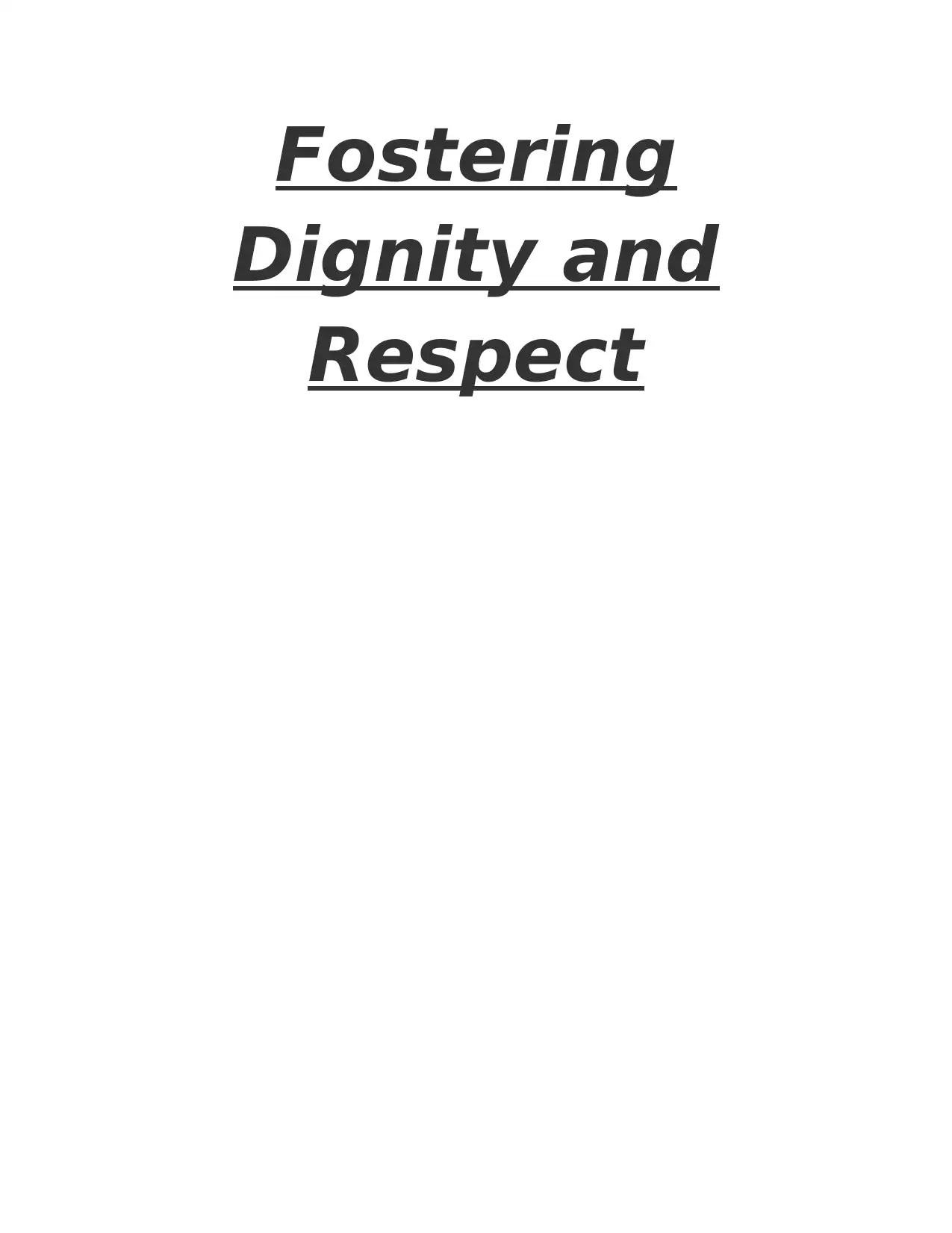
Fostering
Dignity and
Respect
Dignity and
Respect
Paraphrase This Document
Need a fresh take? Get an instant paraphrase of this document with our AI Paraphraser
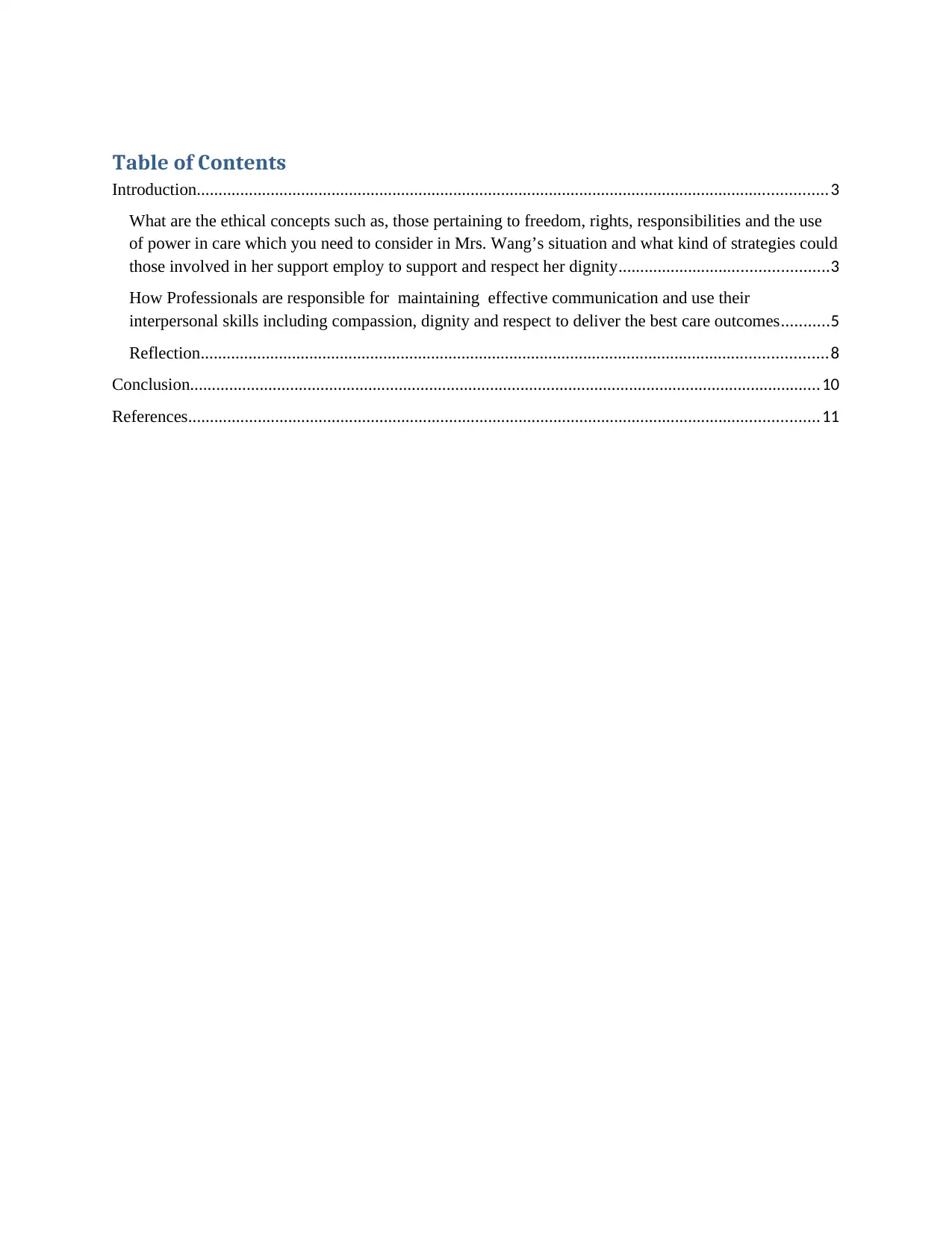
Table of Contents
Introduction.................................................................................................................................................3
What are the ethical concepts such as, those pertaining to freedom, rights, responsibilities and the use
of power in care which you need to consider in Mrs. Wang’s situation and what kind of strategies could
those involved in her support employ to support and respect her dignity................................................3
How Professionals are responsible for maintaining effective communication and use their
interpersonal skills including compassion, dignity and respect to deliver the best care outcomes...........5
Reflection................................................................................................................................................8
Conclusion.................................................................................................................................................10
References.................................................................................................................................................11
Introduction.................................................................................................................................................3
What are the ethical concepts such as, those pertaining to freedom, rights, responsibilities and the use
of power in care which you need to consider in Mrs. Wang’s situation and what kind of strategies could
those involved in her support employ to support and respect her dignity................................................3
How Professionals are responsible for maintaining effective communication and use their
interpersonal skills including compassion, dignity and respect to deliver the best care outcomes...........5
Reflection................................................................................................................................................8
Conclusion.................................................................................................................................................10
References.................................................................................................................................................11
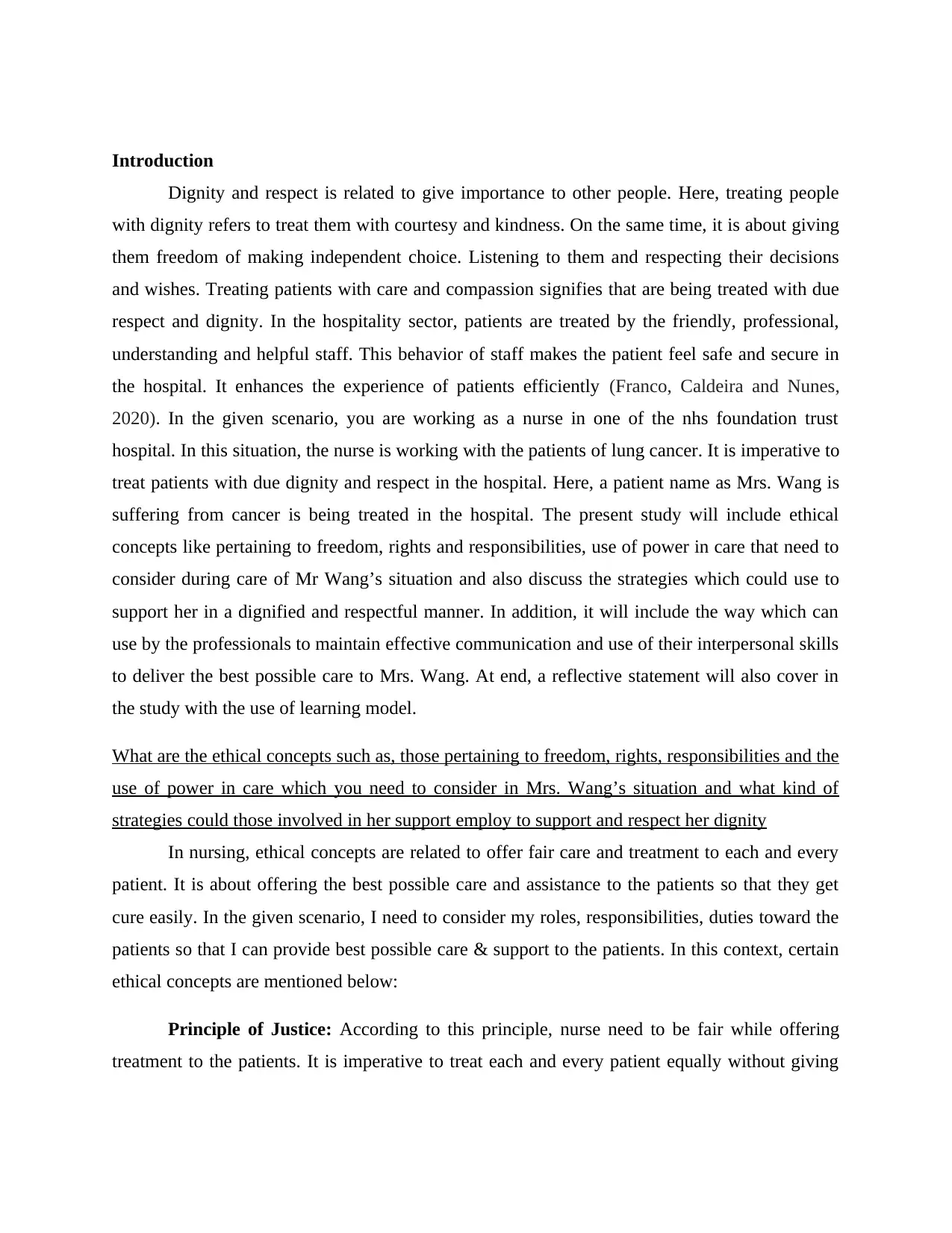
Introduction
Dignity and respect is related to give importance to other people. Here, treating people
with dignity refers to treat them with courtesy and kindness. On the same time, it is about giving
them freedom of making independent choice. Listening to them and respecting their decisions
and wishes. Treating patients with care and compassion signifies that are being treated with due
respect and dignity. In the hospitality sector, patients are treated by the friendly, professional,
understanding and helpful staff. This behavior of staff makes the patient feel safe and secure in
the hospital. It enhances the experience of patients efficiently (Franco, Caldeira and Nunes,
2020). In the given scenario, you are working as a nurse in one of the nhs foundation trust
hospital. In this situation, the nurse is working with the patients of lung cancer. It is imperative to
treat patients with due dignity and respect in the hospital. Here, a patient name as Mrs. Wang is
suffering from cancer is being treated in the hospital. The present study will include ethical
concepts like pertaining to freedom, rights and responsibilities, use of power in care that need to
consider during care of Mr Wang’s situation and also discuss the strategies which could use to
support her in a dignified and respectful manner. In addition, it will include the way which can
use by the professionals to maintain effective communication and use of their interpersonal skills
to deliver the best possible care to Mrs. Wang. At end, a reflective statement will also cover in
the study with the use of learning model.
What are the ethical concepts such as, those pertaining to freedom, rights, responsibilities and the
use of power in care which you need to consider in Mrs. Wang’s situation and what kind of
strategies could those involved in her support employ to support and respect her dignity
In nursing, ethical concepts are related to offer fair care and treatment to each and every
patient. It is about offering the best possible care and assistance to the patients so that they get
cure easily. In the given scenario, I need to consider my roles, responsibilities, duties toward the
patients so that I can provide best possible care & support to the patients. In this context, certain
ethical concepts are mentioned below:
Principle of Justice: According to this principle, nurse need to be fair while offering
treatment to the patients. It is imperative to treat each and every patient equally without giving
Dignity and respect is related to give importance to other people. Here, treating people
with dignity refers to treat them with courtesy and kindness. On the same time, it is about giving
them freedom of making independent choice. Listening to them and respecting their decisions
and wishes. Treating patients with care and compassion signifies that are being treated with due
respect and dignity. In the hospitality sector, patients are treated by the friendly, professional,
understanding and helpful staff. This behavior of staff makes the patient feel safe and secure in
the hospital. It enhances the experience of patients efficiently (Franco, Caldeira and Nunes,
2020). In the given scenario, you are working as a nurse in one of the nhs foundation trust
hospital. In this situation, the nurse is working with the patients of lung cancer. It is imperative to
treat patients with due dignity and respect in the hospital. Here, a patient name as Mrs. Wang is
suffering from cancer is being treated in the hospital. The present study will include ethical
concepts like pertaining to freedom, rights and responsibilities, use of power in care that need to
consider during care of Mr Wang’s situation and also discuss the strategies which could use to
support her in a dignified and respectful manner. In addition, it will include the way which can
use by the professionals to maintain effective communication and use of their interpersonal skills
to deliver the best possible care to Mrs. Wang. At end, a reflective statement will also cover in
the study with the use of learning model.
What are the ethical concepts such as, those pertaining to freedom, rights, responsibilities and the
use of power in care which you need to consider in Mrs. Wang’s situation and what kind of
strategies could those involved in her support employ to support and respect her dignity
In nursing, ethical concepts are related to offer fair care and treatment to each and every
patient. It is about offering the best possible care and assistance to the patients so that they get
cure easily. In the given scenario, I need to consider my roles, responsibilities, duties toward the
patients so that I can provide best possible care & support to the patients. In this context, certain
ethical concepts are mentioned below:
Principle of Justice: According to this principle, nurse need to be fair while offering
treatment to the patients. It is imperative to treat each and every patient equally without giving
⊘ This is a preview!⊘
Do you want full access?
Subscribe today to unlock all pages.

Trusted by 1+ million students worldwide
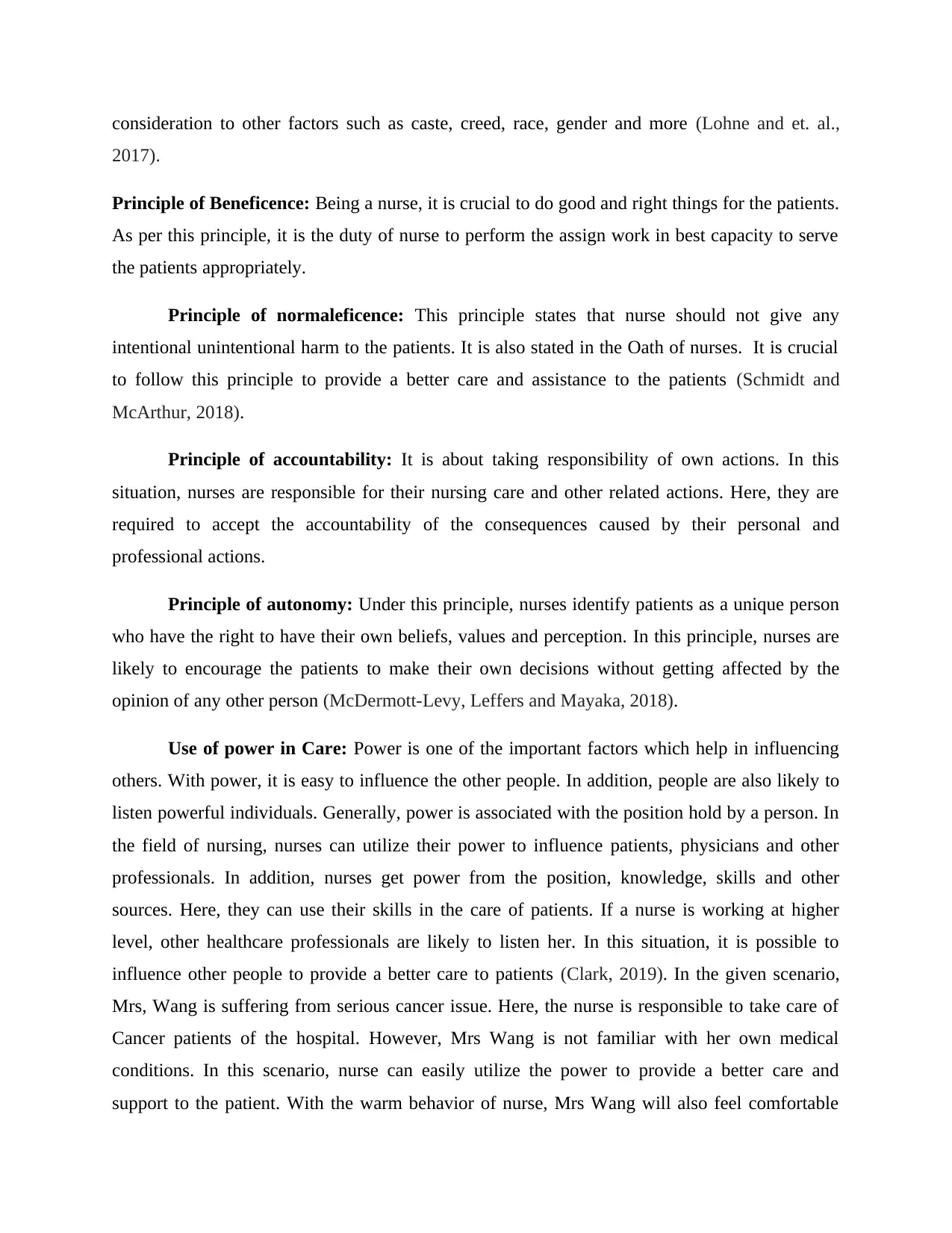
consideration to other factors such as caste, creed, race, gender and more (Lohne and et. al.,
2017).
Principle of Beneficence: Being a nurse, it is crucial to do good and right things for the patients.
As per this principle, it is the duty of nurse to perform the assign work in best capacity to serve
the patients appropriately.
Principle of normaleficence: This principle states that nurse should not give any
intentional unintentional harm to the patients. It is also stated in the Oath of nurses. It is crucial
to follow this principle to provide a better care and assistance to the patients (Schmidt and
McArthur, 2018).
Principle of accountability: It is about taking responsibility of own actions. In this
situation, nurses are responsible for their nursing care and other related actions. Here, they are
required to accept the accountability of the consequences caused by their personal and
professional actions.
Principle of autonomy: Under this principle, nurses identify patients as a unique person
who have the right to have their own beliefs, values and perception. In this principle, nurses are
likely to encourage the patients to make their own decisions without getting affected by the
opinion of any other person (McDermott-Levy, Leffers and Mayaka, 2018).
Use of power in Care: Power is one of the important factors which help in influencing
others. With power, it is easy to influence the other people. In addition, people are also likely to
listen powerful individuals. Generally, power is associated with the position hold by a person. In
the field of nursing, nurses can utilize their power to influence patients, physicians and other
professionals. In addition, nurses get power from the position, knowledge, skills and other
sources. Here, they can use their skills in the care of patients. If a nurse is working at higher
level, other healthcare professionals are likely to listen her. In this situation, it is possible to
influence other people to provide a better care to patients (Clark, 2019). In the given scenario,
Mrs, Wang is suffering from serious cancer issue. Here, the nurse is responsible to take care of
Cancer patients of the hospital. However, Mrs Wang is not familiar with her own medical
conditions. In this scenario, nurse can easily utilize the power to provide a better care and
support to the patient. With the warm behavior of nurse, Mrs Wang will also feel comfortable
2017).
Principle of Beneficence: Being a nurse, it is crucial to do good and right things for the patients.
As per this principle, it is the duty of nurse to perform the assign work in best capacity to serve
the patients appropriately.
Principle of normaleficence: This principle states that nurse should not give any
intentional unintentional harm to the patients. It is also stated in the Oath of nurses. It is crucial
to follow this principle to provide a better care and assistance to the patients (Schmidt and
McArthur, 2018).
Principle of accountability: It is about taking responsibility of own actions. In this
situation, nurses are responsible for their nursing care and other related actions. Here, they are
required to accept the accountability of the consequences caused by their personal and
professional actions.
Principle of autonomy: Under this principle, nurses identify patients as a unique person
who have the right to have their own beliefs, values and perception. In this principle, nurses are
likely to encourage the patients to make their own decisions without getting affected by the
opinion of any other person (McDermott-Levy, Leffers and Mayaka, 2018).
Use of power in Care: Power is one of the important factors which help in influencing
others. With power, it is easy to influence the other people. In addition, people are also likely to
listen powerful individuals. Generally, power is associated with the position hold by a person. In
the field of nursing, nurses can utilize their power to influence patients, physicians and other
professionals. In addition, nurses get power from the position, knowledge, skills and other
sources. Here, they can use their skills in the care of patients. If a nurse is working at higher
level, other healthcare professionals are likely to listen her. In this situation, it is possible to
influence other people to provide a better care to patients (Clark, 2019). In the given scenario,
Mrs, Wang is suffering from serious cancer issue. Here, the nurse is responsible to take care of
Cancer patients of the hospital. However, Mrs Wang is not familiar with her own medical
conditions. In this scenario, nurse can easily utilize the power to provide a better care and
support to the patient. With the warm behavior of nurse, Mrs Wang will also feel comfortable
Paraphrase This Document
Need a fresh take? Get an instant paraphrase of this document with our AI Paraphraser
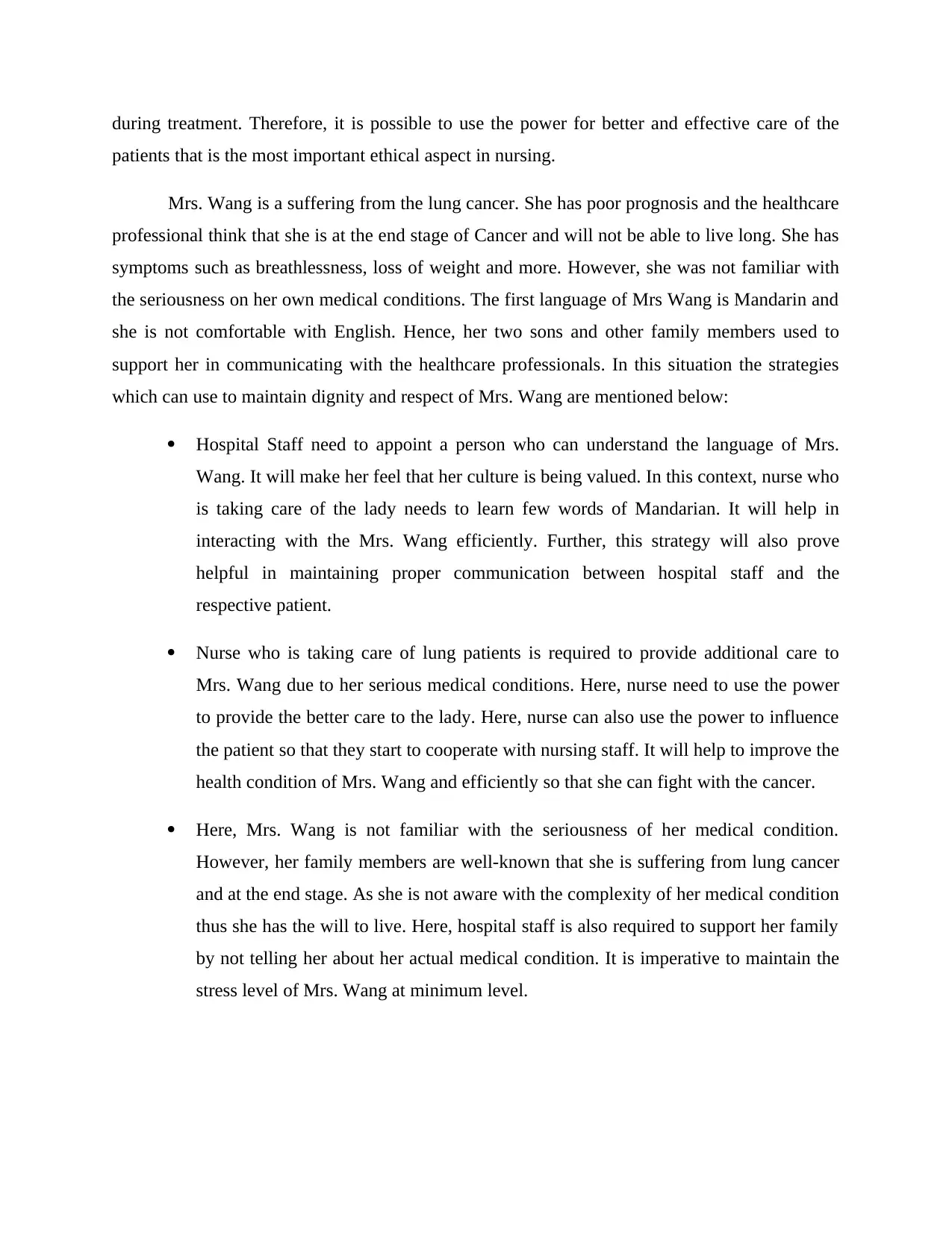
during treatment. Therefore, it is possible to use the power for better and effective care of the
patients that is the most important ethical aspect in nursing.
Mrs. Wang is a suffering from the lung cancer. She has poor prognosis and the healthcare
professional think that she is at the end stage of Cancer and will not be able to live long. She has
symptoms such as breathlessness, loss of weight and more. However, she was not familiar with
the seriousness on her own medical conditions. The first language of Mrs Wang is Mandarin and
she is not comfortable with English. Hence, her two sons and other family members used to
support her in communicating with the healthcare professionals. In this situation the strategies
which can use to maintain dignity and respect of Mrs. Wang are mentioned below:
Hospital Staff need to appoint a person who can understand the language of Mrs.
Wang. It will make her feel that her culture is being valued. In this context, nurse who
is taking care of the lady needs to learn few words of Mandarian. It will help in
interacting with the Mrs. Wang efficiently. Further, this strategy will also prove
helpful in maintaining proper communication between hospital staff and the
respective patient.
Nurse who is taking care of lung patients is required to provide additional care to
Mrs. Wang due to her serious medical conditions. Here, nurse need to use the power
to provide the better care to the lady. Here, nurse can also use the power to influence
the patient so that they start to cooperate with nursing staff. It will help to improve the
health condition of Mrs. Wang and efficiently so that she can fight with the cancer.
Here, Mrs. Wang is not familiar with the seriousness of her medical condition.
However, her family members are well-known that she is suffering from lung cancer
and at the end stage. As she is not aware with the complexity of her medical condition
thus she has the will to live. Here, hospital staff is also required to support her family
by not telling her about her actual medical condition. It is imperative to maintain the
stress level of Mrs. Wang at minimum level.
patients that is the most important ethical aspect in nursing.
Mrs. Wang is a suffering from the lung cancer. She has poor prognosis and the healthcare
professional think that she is at the end stage of Cancer and will not be able to live long. She has
symptoms such as breathlessness, loss of weight and more. However, she was not familiar with
the seriousness on her own medical conditions. The first language of Mrs Wang is Mandarin and
she is not comfortable with English. Hence, her two sons and other family members used to
support her in communicating with the healthcare professionals. In this situation the strategies
which can use to maintain dignity and respect of Mrs. Wang are mentioned below:
Hospital Staff need to appoint a person who can understand the language of Mrs.
Wang. It will make her feel that her culture is being valued. In this context, nurse who
is taking care of the lady needs to learn few words of Mandarian. It will help in
interacting with the Mrs. Wang efficiently. Further, this strategy will also prove
helpful in maintaining proper communication between hospital staff and the
respective patient.
Nurse who is taking care of lung patients is required to provide additional care to
Mrs. Wang due to her serious medical conditions. Here, nurse need to use the power
to provide the better care to the lady. Here, nurse can also use the power to influence
the patient so that they start to cooperate with nursing staff. It will help to improve the
health condition of Mrs. Wang and efficiently so that she can fight with the cancer.
Here, Mrs. Wang is not familiar with the seriousness of her medical condition.
However, her family members are well-known that she is suffering from lung cancer
and at the end stage. As she is not aware with the complexity of her medical condition
thus she has the will to live. Here, hospital staff is also required to support her family
by not telling her about her actual medical condition. It is imperative to maintain the
stress level of Mrs. Wang at minimum level.
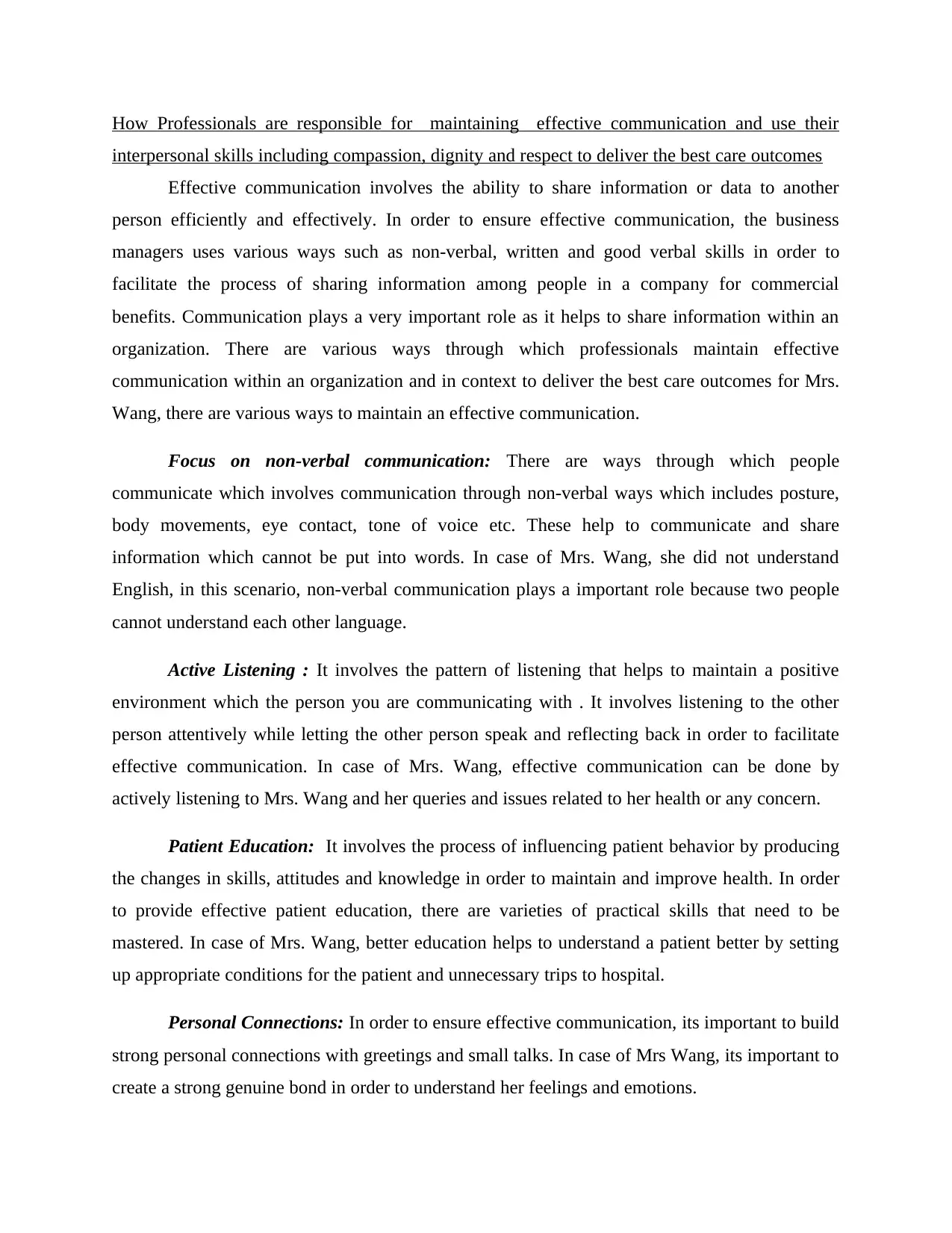
How Professionals are responsible for maintaining effective communication and use their
interpersonal skills including compassion, dignity and respect to deliver the best care outcomes
Effective communication involves the ability to share information or data to another
person efficiently and effectively. In order to ensure effective communication, the business
managers uses various ways such as non-verbal, written and good verbal skills in order to
facilitate the process of sharing information among people in a company for commercial
benefits. Communication plays a very important role as it helps to share information within an
organization. There are various ways through which professionals maintain effective
communication within an organization and in context to deliver the best care outcomes for Mrs.
Wang, there are various ways to maintain an effective communication.
Focus on non-verbal communication: There are ways through which people
communicate which involves communication through non-verbal ways which includes posture,
body movements, eye contact, tone of voice etc. These help to communicate and share
information which cannot be put into words. In case of Mrs. Wang, she did not understand
English, in this scenario, non-verbal communication plays a important role because two people
cannot understand each other language.
Active Listening : It involves the pattern of listening that helps to maintain a positive
environment which the person you are communicating with . It involves listening to the other
person attentively while letting the other person speak and reflecting back in order to facilitate
effective communication. In case of Mrs. Wang, effective communication can be done by
actively listening to Mrs. Wang and her queries and issues related to her health or any concern.
Patient Education: It involves the process of influencing patient behavior by producing
the changes in skills, attitudes and knowledge in order to maintain and improve health. In order
to provide effective patient education, there are varieties of practical skills that need to be
mastered. In case of Mrs. Wang, better education helps to understand a patient better by setting
up appropriate conditions for the patient and unnecessary trips to hospital.
Personal Connections: In order to ensure effective communication, its important to build
strong personal connections with greetings and small talks. In case of Mrs Wang, its important to
create a strong genuine bond in order to understand her feelings and emotions.
interpersonal skills including compassion, dignity and respect to deliver the best care outcomes
Effective communication involves the ability to share information or data to another
person efficiently and effectively. In order to ensure effective communication, the business
managers uses various ways such as non-verbal, written and good verbal skills in order to
facilitate the process of sharing information among people in a company for commercial
benefits. Communication plays a very important role as it helps to share information within an
organization. There are various ways through which professionals maintain effective
communication within an organization and in context to deliver the best care outcomes for Mrs.
Wang, there are various ways to maintain an effective communication.
Focus on non-verbal communication: There are ways through which people
communicate which involves communication through non-verbal ways which includes posture,
body movements, eye contact, tone of voice etc. These help to communicate and share
information which cannot be put into words. In case of Mrs. Wang, she did not understand
English, in this scenario, non-verbal communication plays a important role because two people
cannot understand each other language.
Active Listening : It involves the pattern of listening that helps to maintain a positive
environment which the person you are communicating with . It involves listening to the other
person attentively while letting the other person speak and reflecting back in order to facilitate
effective communication. In case of Mrs. Wang, effective communication can be done by
actively listening to Mrs. Wang and her queries and issues related to her health or any concern.
Patient Education: It involves the process of influencing patient behavior by producing
the changes in skills, attitudes and knowledge in order to maintain and improve health. In order
to provide effective patient education, there are varieties of practical skills that need to be
mastered. In case of Mrs. Wang, better education helps to understand a patient better by setting
up appropriate conditions for the patient and unnecessary trips to hospital.
Personal Connections: In order to ensure effective communication, its important to build
strong personal connections with greetings and small talks. In case of Mrs Wang, its important to
create a strong genuine bond in order to understand her feelings and emotions.
⊘ This is a preview!⊘
Do you want full access?
Subscribe today to unlock all pages.

Trusted by 1+ million students worldwide
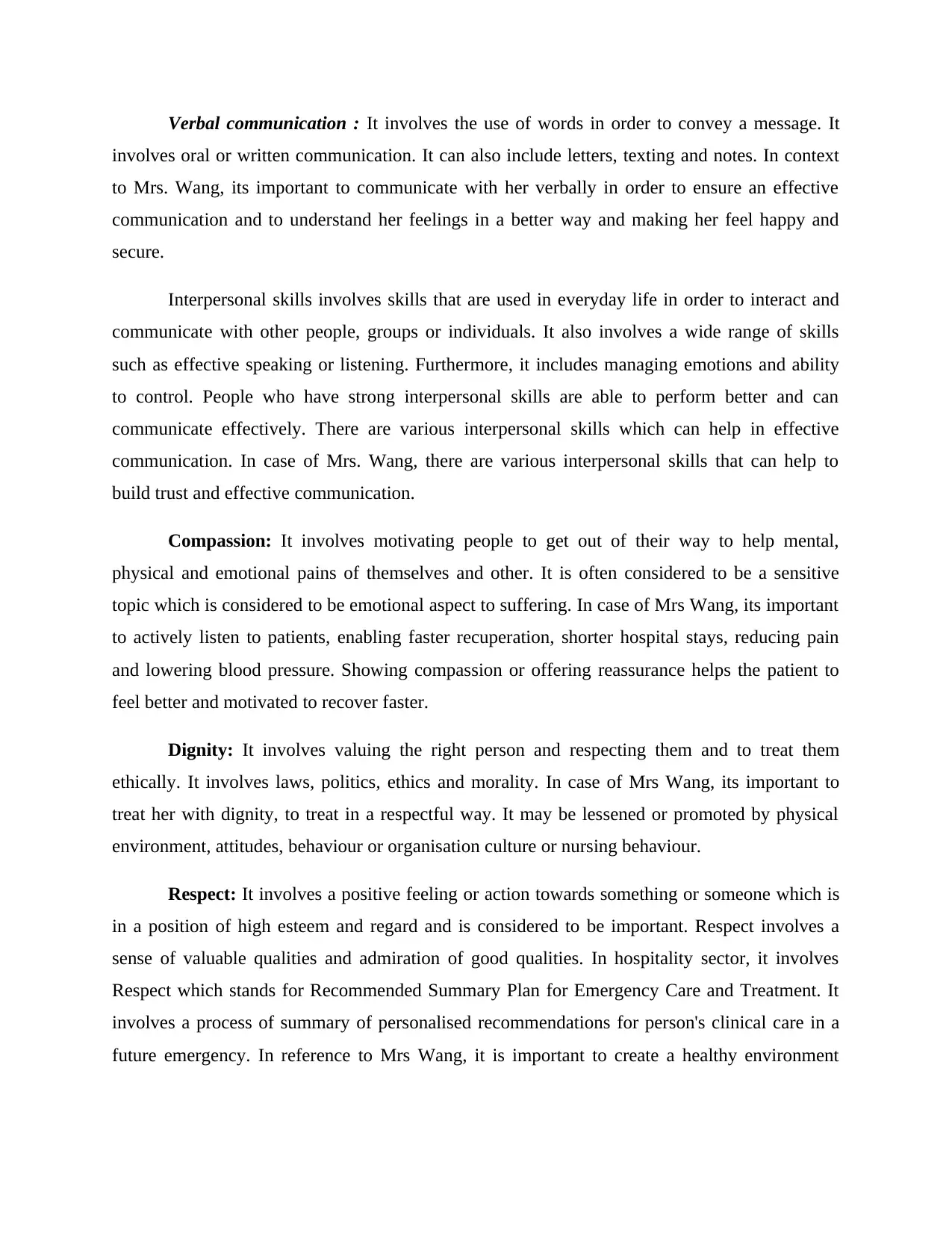
Verbal communication : It involves the use of words in order to convey a message. It
involves oral or written communication. It can also include letters, texting and notes. In context
to Mrs. Wang, its important to communicate with her verbally in order to ensure an effective
communication and to understand her feelings in a better way and making her feel happy and
secure.
Interpersonal skills involves skills that are used in everyday life in order to interact and
communicate with other people, groups or individuals. It also involves a wide range of skills
such as effective speaking or listening. Furthermore, it includes managing emotions and ability
to control. People who have strong interpersonal skills are able to perform better and can
communicate effectively. There are various interpersonal skills which can help in effective
communication. In case of Mrs. Wang, there are various interpersonal skills that can help to
build trust and effective communication.
Compassion: It involves motivating people to get out of their way to help mental,
physical and emotional pains of themselves and other. It is often considered to be a sensitive
topic which is considered to be emotional aspect to suffering. In case of Mrs Wang, its important
to actively listen to patients, enabling faster recuperation, shorter hospital stays, reducing pain
and lowering blood pressure. Showing compassion or offering reassurance helps the patient to
feel better and motivated to recover faster.
Dignity: It involves valuing the right person and respecting them and to treat them
ethically. It involves laws, politics, ethics and morality. In case of Mrs Wang, its important to
treat her with dignity, to treat in a respectful way. It may be lessened or promoted by physical
environment, attitudes, behaviour or organisation culture or nursing behaviour.
Respect: It involves a positive feeling or action towards something or someone which is
in a position of high esteem and regard and is considered to be important. Respect involves a
sense of valuable qualities and admiration of good qualities. In hospitality sector, it involves
Respect which stands for Recommended Summary Plan for Emergency Care and Treatment. It
involves a process of summary of personalised recommendations for person's clinical care in a
future emergency. In reference to Mrs Wang, it is important to create a healthy environment
involves oral or written communication. It can also include letters, texting and notes. In context
to Mrs. Wang, its important to communicate with her verbally in order to ensure an effective
communication and to understand her feelings in a better way and making her feel happy and
secure.
Interpersonal skills involves skills that are used in everyday life in order to interact and
communicate with other people, groups or individuals. It also involves a wide range of skills
such as effective speaking or listening. Furthermore, it includes managing emotions and ability
to control. People who have strong interpersonal skills are able to perform better and can
communicate effectively. There are various interpersonal skills which can help in effective
communication. In case of Mrs. Wang, there are various interpersonal skills that can help to
build trust and effective communication.
Compassion: It involves motivating people to get out of their way to help mental,
physical and emotional pains of themselves and other. It is often considered to be a sensitive
topic which is considered to be emotional aspect to suffering. In case of Mrs Wang, its important
to actively listen to patients, enabling faster recuperation, shorter hospital stays, reducing pain
and lowering blood pressure. Showing compassion or offering reassurance helps the patient to
feel better and motivated to recover faster.
Dignity: It involves valuing the right person and respecting them and to treat them
ethically. It involves laws, politics, ethics and morality. In case of Mrs Wang, its important to
treat her with dignity, to treat in a respectful way. It may be lessened or promoted by physical
environment, attitudes, behaviour or organisation culture or nursing behaviour.
Respect: It involves a positive feeling or action towards something or someone which is
in a position of high esteem and regard and is considered to be important. Respect involves a
sense of valuable qualities and admiration of good qualities. In hospitality sector, it involves
Respect which stands for Recommended Summary Plan for Emergency Care and Treatment. It
involves a process of summary of personalised recommendations for person's clinical care in a
future emergency. In reference to Mrs Wang, it is important to create a healthy environment
Paraphrase This Document
Need a fresh take? Get an instant paraphrase of this document with our AI Paraphraser
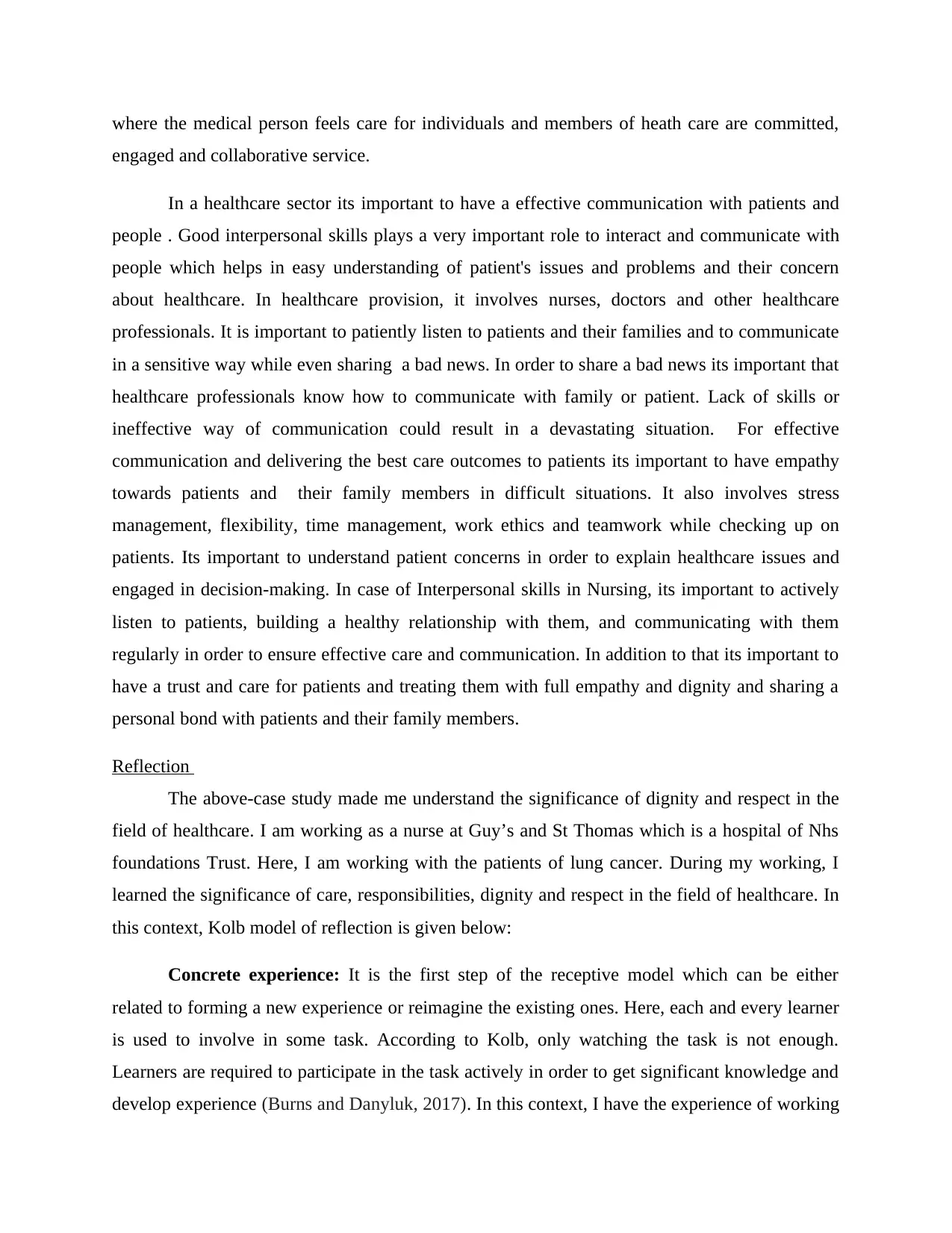
where the medical person feels care for individuals and members of heath care are committed,
engaged and collaborative service.
In a healthcare sector its important to have a effective communication with patients and
people . Good interpersonal skills plays a very important role to interact and communicate with
people which helps in easy understanding of patient's issues and problems and their concern
about healthcare. In healthcare provision, it involves nurses, doctors and other healthcare
professionals. It is important to patiently listen to patients and their families and to communicate
in a sensitive way while even sharing a bad news. In order to share a bad news its important that
healthcare professionals know how to communicate with family or patient. Lack of skills or
ineffective way of communication could result in a devastating situation. For effective
communication and delivering the best care outcomes to patients its important to have empathy
towards patients and their family members in difficult situations. It also involves stress
management, flexibility, time management, work ethics and teamwork while checking up on
patients. Its important to understand patient concerns in order to explain healthcare issues and
engaged in decision-making. In case of Interpersonal skills in Nursing, its important to actively
listen to patients, building a healthy relationship with them, and communicating with them
regularly in order to ensure effective care and communication. In addition to that its important to
have a trust and care for patients and treating them with full empathy and dignity and sharing a
personal bond with patients and their family members.
Reflection
The above-case study made me understand the significance of dignity and respect in the
field of healthcare. I am working as a nurse at Guy’s and St Thomas which is a hospital of Nhs
foundations Trust. Here, I am working with the patients of lung cancer. During my working, I
learned the significance of care, responsibilities, dignity and respect in the field of healthcare. In
this context, Kolb model of reflection is given below:
Concrete experience: It is the first step of the receptive model which can be either
related to forming a new experience or reimagine the existing ones. Here, each and every learner
is used to involve in some task. According to Kolb, only watching the task is not enough.
Learners are required to participate in the task actively in order to get significant knowledge and
develop experience (Burns and Danyluk, 2017). In this context, I have the experience of working
engaged and collaborative service.
In a healthcare sector its important to have a effective communication with patients and
people . Good interpersonal skills plays a very important role to interact and communicate with
people which helps in easy understanding of patient's issues and problems and their concern
about healthcare. In healthcare provision, it involves nurses, doctors and other healthcare
professionals. It is important to patiently listen to patients and their families and to communicate
in a sensitive way while even sharing a bad news. In order to share a bad news its important that
healthcare professionals know how to communicate with family or patient. Lack of skills or
ineffective way of communication could result in a devastating situation. For effective
communication and delivering the best care outcomes to patients its important to have empathy
towards patients and their family members in difficult situations. It also involves stress
management, flexibility, time management, work ethics and teamwork while checking up on
patients. Its important to understand patient concerns in order to explain healthcare issues and
engaged in decision-making. In case of Interpersonal skills in Nursing, its important to actively
listen to patients, building a healthy relationship with them, and communicating with them
regularly in order to ensure effective care and communication. In addition to that its important to
have a trust and care for patients and treating them with full empathy and dignity and sharing a
personal bond with patients and their family members.
Reflection
The above-case study made me understand the significance of dignity and respect in the
field of healthcare. I am working as a nurse at Guy’s and St Thomas which is a hospital of Nhs
foundations Trust. Here, I am working with the patients of lung cancer. During my working, I
learned the significance of care, responsibilities, dignity and respect in the field of healthcare. In
this context, Kolb model of reflection is given below:
Concrete experience: It is the first step of the receptive model which can be either
related to forming a new experience or reimagine the existing ones. Here, each and every learner
is used to involve in some task. According to Kolb, only watching the task is not enough.
Learners are required to participate in the task actively in order to get significant knowledge and
develop experience (Burns and Danyluk, 2017). In this context, I have the experience of working
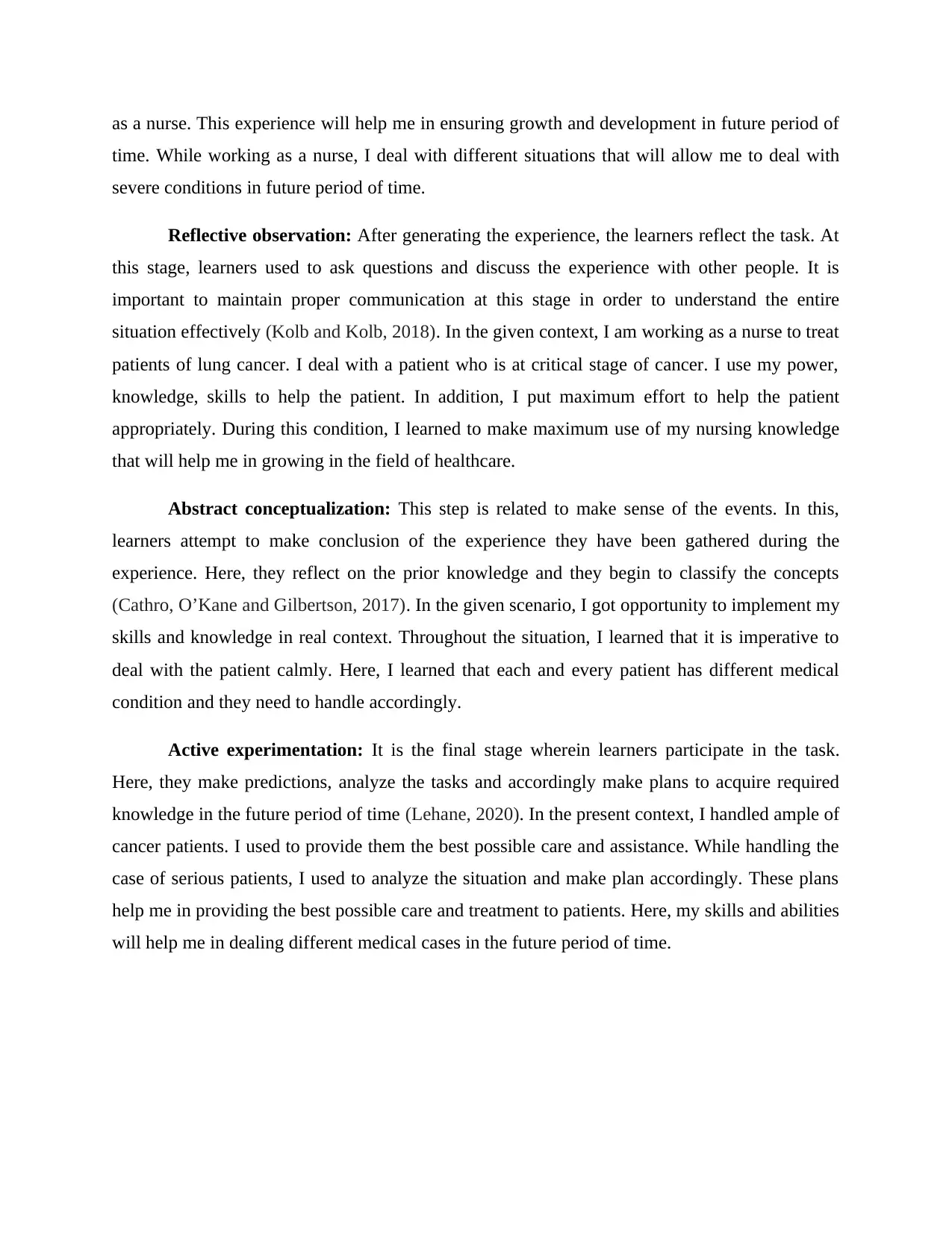
as a nurse. This experience will help me in ensuring growth and development in future period of
time. While working as a nurse, I deal with different situations that will allow me to deal with
severe conditions in future period of time.
Reflective observation: After generating the experience, the learners reflect the task. At
this stage, learners used to ask questions and discuss the experience with other people. It is
important to maintain proper communication at this stage in order to understand the entire
situation effectively (Kolb and Kolb, 2018). In the given context, I am working as a nurse to treat
patients of lung cancer. I deal with a patient who is at critical stage of cancer. I use my power,
knowledge, skills to help the patient. In addition, I put maximum effort to help the patient
appropriately. During this condition, I learned to make maximum use of my nursing knowledge
that will help me in growing in the field of healthcare.
Abstract conceptualization: This step is related to make sense of the events. In this,
learners attempt to make conclusion of the experience they have been gathered during the
experience. Here, they reflect on the prior knowledge and they begin to classify the concepts
(Cathro, O’Kane and Gilbertson, 2017). In the given scenario, I got opportunity to implement my
skills and knowledge in real context. Throughout the situation, I learned that it is imperative to
deal with the patient calmly. Here, I learned that each and every patient has different medical
condition and they need to handle accordingly.
Active experimentation: It is the final stage wherein learners participate in the task.
Here, they make predictions, analyze the tasks and accordingly make plans to acquire required
knowledge in the future period of time (Lehane, 2020). In the present context, I handled ample of
cancer patients. I used to provide them the best possible care and assistance. While handling the
case of serious patients, I used to analyze the situation and make plan accordingly. These plans
help me in providing the best possible care and treatment to patients. Here, my skills and abilities
will help me in dealing different medical cases in the future period of time.
time. While working as a nurse, I deal with different situations that will allow me to deal with
severe conditions in future period of time.
Reflective observation: After generating the experience, the learners reflect the task. At
this stage, learners used to ask questions and discuss the experience with other people. It is
important to maintain proper communication at this stage in order to understand the entire
situation effectively (Kolb and Kolb, 2018). In the given context, I am working as a nurse to treat
patients of lung cancer. I deal with a patient who is at critical stage of cancer. I use my power,
knowledge, skills to help the patient. In addition, I put maximum effort to help the patient
appropriately. During this condition, I learned to make maximum use of my nursing knowledge
that will help me in growing in the field of healthcare.
Abstract conceptualization: This step is related to make sense of the events. In this,
learners attempt to make conclusion of the experience they have been gathered during the
experience. Here, they reflect on the prior knowledge and they begin to classify the concepts
(Cathro, O’Kane and Gilbertson, 2017). In the given scenario, I got opportunity to implement my
skills and knowledge in real context. Throughout the situation, I learned that it is imperative to
deal with the patient calmly. Here, I learned that each and every patient has different medical
condition and they need to handle accordingly.
Active experimentation: It is the final stage wherein learners participate in the task.
Here, they make predictions, analyze the tasks and accordingly make plans to acquire required
knowledge in the future period of time (Lehane, 2020). In the present context, I handled ample of
cancer patients. I used to provide them the best possible care and assistance. While handling the
case of serious patients, I used to analyze the situation and make plan accordingly. These plans
help me in providing the best possible care and treatment to patients. Here, my skills and abilities
will help me in dealing different medical cases in the future period of time.
⊘ This is a preview!⊘
Do you want full access?
Subscribe today to unlock all pages.

Trusted by 1+ million students worldwide
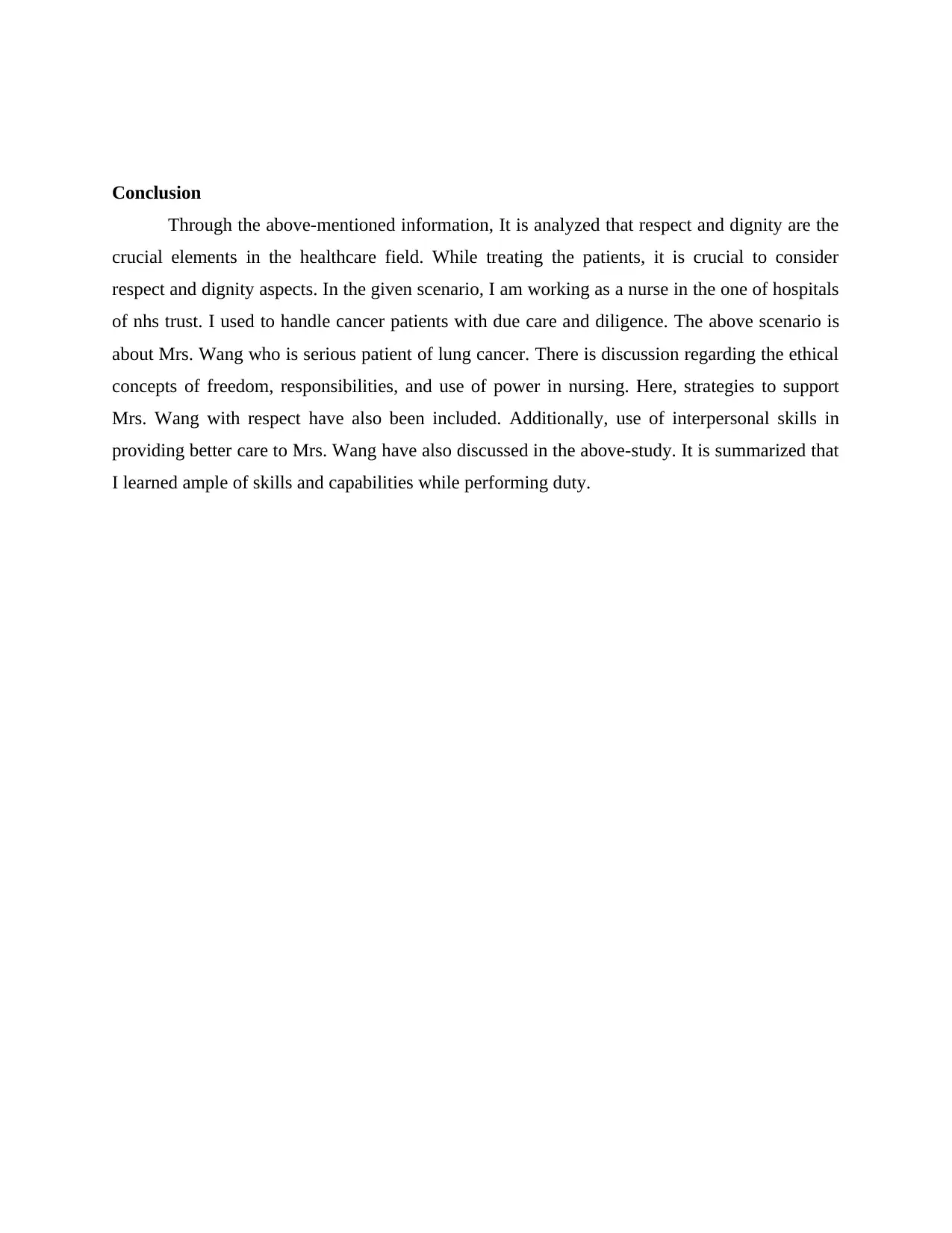
Conclusion
Through the above-mentioned information, It is analyzed that respect and dignity are the
crucial elements in the healthcare field. While treating the patients, it is crucial to consider
respect and dignity aspects. In the given scenario, I am working as a nurse in the one of hospitals
of nhs trust. I used to handle cancer patients with due care and diligence. The above scenario is
about Mrs. Wang who is serious patient of lung cancer. There is discussion regarding the ethical
concepts of freedom, responsibilities, and use of power in nursing. Here, strategies to support
Mrs. Wang with respect have also been included. Additionally, use of interpersonal skills in
providing better care to Mrs. Wang have also discussed in the above-study. It is summarized that
I learned ample of skills and capabilities while performing duty.
Through the above-mentioned information, It is analyzed that respect and dignity are the
crucial elements in the healthcare field. While treating the patients, it is crucial to consider
respect and dignity aspects. In the given scenario, I am working as a nurse in the one of hospitals
of nhs trust. I used to handle cancer patients with due care and diligence. The above scenario is
about Mrs. Wang who is serious patient of lung cancer. There is discussion regarding the ethical
concepts of freedom, responsibilities, and use of power in nursing. Here, strategies to support
Mrs. Wang with respect have also been included. Additionally, use of interpersonal skills in
providing better care to Mrs. Wang have also discussed in the above-study. It is summarized that
I learned ample of skills and capabilities while performing duty.
Paraphrase This Document
Need a fresh take? Get an instant paraphrase of this document with our AI Paraphraser
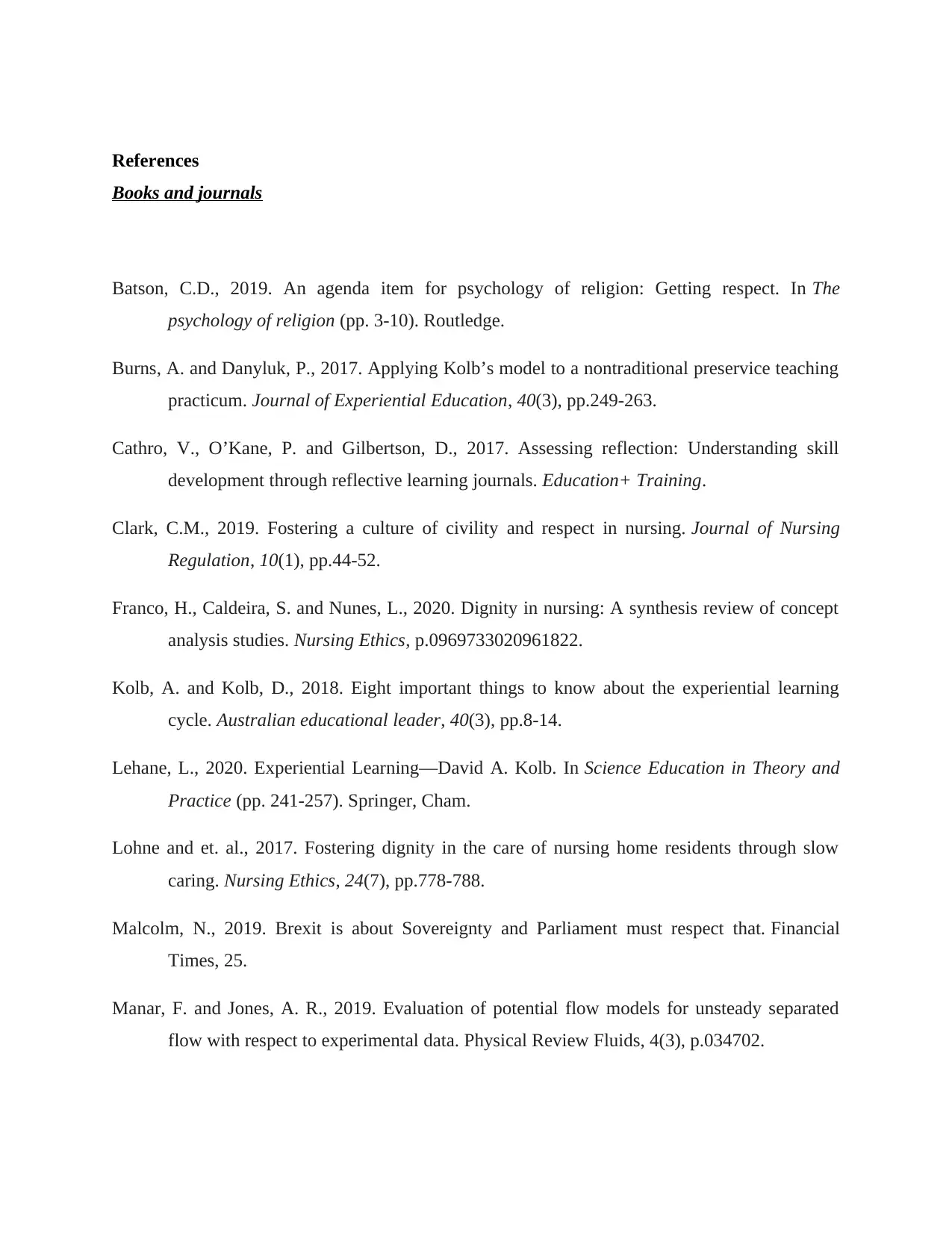
References
Books and journals
Batson, C.D., 2019. An agenda item for psychology of religion: Getting respect. In The
psychology of religion (pp. 3-10). Routledge.
Burns, A. and Danyluk, P., 2017. Applying Kolb’s model to a nontraditional preservice teaching
practicum. Journal of Experiential Education, 40(3), pp.249-263.
Cathro, V., O’Kane, P. and Gilbertson, D., 2017. Assessing reflection: Understanding skill
development through reflective learning journals. Education+ Training.
Clark, C.M., 2019. Fostering a culture of civility and respect in nursing. Journal of Nursing
Regulation, 10(1), pp.44-52.
Franco, H., Caldeira, S. and Nunes, L., 2020. Dignity in nursing: A synthesis review of concept
analysis studies. Nursing Ethics, p.0969733020961822.
Kolb, A. and Kolb, D., 2018. Eight important things to know about the experiential learning
cycle. Australian educational leader, 40(3), pp.8-14.
Lehane, L., 2020. Experiential Learning—David A. Kolb. In Science Education in Theory and
Practice (pp. 241-257). Springer, Cham.
Lohne and et. al., 2017. Fostering dignity in the care of nursing home residents through slow
caring. Nursing Ethics, 24(7), pp.778-788.
Malcolm, N., 2019. Brexit is about Sovereignty and Parliament must respect that. Financial
Times, 25.
Manar, F. and Jones, A. R., 2019. Evaluation of potential flow models for unsteady separated
flow with respect to experimental data. Physical Review Fluids, 4(3), p.034702.
Books and journals
Batson, C.D., 2019. An agenda item for psychology of religion: Getting respect. In The
psychology of religion (pp. 3-10). Routledge.
Burns, A. and Danyluk, P., 2017. Applying Kolb’s model to a nontraditional preservice teaching
practicum. Journal of Experiential Education, 40(3), pp.249-263.
Cathro, V., O’Kane, P. and Gilbertson, D., 2017. Assessing reflection: Understanding skill
development through reflective learning journals. Education+ Training.
Clark, C.M., 2019. Fostering a culture of civility and respect in nursing. Journal of Nursing
Regulation, 10(1), pp.44-52.
Franco, H., Caldeira, S. and Nunes, L., 2020. Dignity in nursing: A synthesis review of concept
analysis studies. Nursing Ethics, p.0969733020961822.
Kolb, A. and Kolb, D., 2018. Eight important things to know about the experiential learning
cycle. Australian educational leader, 40(3), pp.8-14.
Lehane, L., 2020. Experiential Learning—David A. Kolb. In Science Education in Theory and
Practice (pp. 241-257). Springer, Cham.
Lohne and et. al., 2017. Fostering dignity in the care of nursing home residents through slow
caring. Nursing Ethics, 24(7), pp.778-788.
Malcolm, N., 2019. Brexit is about Sovereignty and Parliament must respect that. Financial
Times, 25.
Manar, F. and Jones, A. R., 2019. Evaluation of potential flow models for unsteady separated
flow with respect to experimental data. Physical Review Fluids, 4(3), p.034702.
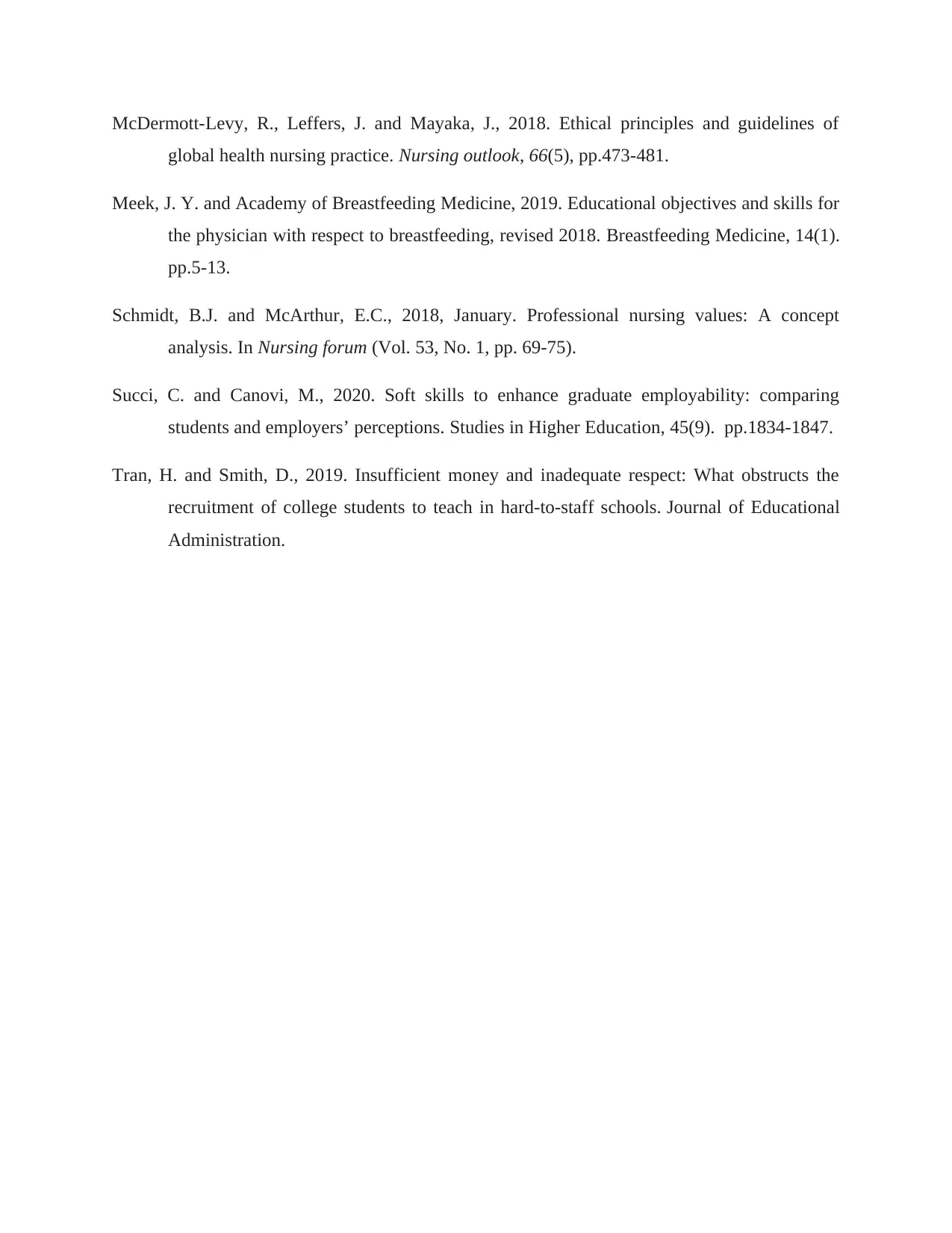
McDermott-Levy, R., Leffers, J. and Mayaka, J., 2018. Ethical principles and guidelines of
global health nursing practice. Nursing outlook, 66(5), pp.473-481.
Meek, J. Y. and Academy of Breastfeeding Medicine, 2019. Educational objectives and skills for
the physician with respect to breastfeeding, revised 2018. Breastfeeding Medicine, 14(1).
pp.5-13.
Schmidt, B.J. and McArthur, E.C., 2018, January. Professional nursing values: A concept
analysis. In Nursing forum (Vol. 53, No. 1, pp. 69-75).
Succi, C. and Canovi, M., 2020. Soft skills to enhance graduate employability: comparing
students and employers’ perceptions. Studies in Higher Education, 45(9). pp.1834-1847.
Tran, H. and Smith, D., 2019. Insufficient money and inadequate respect: What obstructs the
recruitment of college students to teach in hard-to-staff schools. Journal of Educational
Administration.
global health nursing practice. Nursing outlook, 66(5), pp.473-481.
Meek, J. Y. and Academy of Breastfeeding Medicine, 2019. Educational objectives and skills for
the physician with respect to breastfeeding, revised 2018. Breastfeeding Medicine, 14(1).
pp.5-13.
Schmidt, B.J. and McArthur, E.C., 2018, January. Professional nursing values: A concept
analysis. In Nursing forum (Vol. 53, No. 1, pp. 69-75).
Succi, C. and Canovi, M., 2020. Soft skills to enhance graduate employability: comparing
students and employers’ perceptions. Studies in Higher Education, 45(9). pp.1834-1847.
Tran, H. and Smith, D., 2019. Insufficient money and inadequate respect: What obstructs the
recruitment of college students to teach in hard-to-staff schools. Journal of Educational
Administration.
⊘ This is a preview!⊘
Do you want full access?
Subscribe today to unlock all pages.

Trusted by 1+ million students worldwide
1 out of 12
Related Documents
Your All-in-One AI-Powered Toolkit for Academic Success.
+13062052269
info@desklib.com
Available 24*7 on WhatsApp / Email
![[object Object]](/_next/static/media/star-bottom.7253800d.svg)
Unlock your academic potential
Copyright © 2020–2026 A2Z Services. All Rights Reserved. Developed and managed by ZUCOL.

